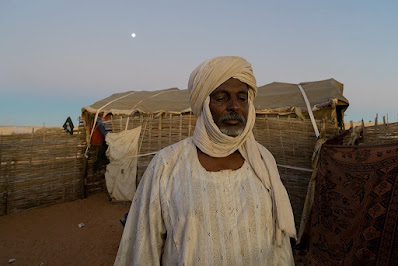By Lethabo Nxumalo
Dated Friday, 6 October 2023 - here is a full copy:
Luol Deng: South Sudan’s great rebound
Hope: Luol Deng (centre) trains young players at the Manute Bol basketball court, built by the two-time All-Star NBA player’s foundation in South Sudan’s capital Juba. Photo: Akuot Chol/AFP
In 2024, South Sudan’s men’s basketball team will be at the Olympics for the first time. The 13-year-old nation qualified for the Paris event after a 101-78 win over Angola at the Fiba World Cup.
In the jubilant locker room after that decisive game, among the elated, perspiring, screaming and dancing players, stood Luol Deng.
The two-time All-Star NBA player is a class act; a consummate professional on and off the court, a humanitarian whose work has won him multiple awards, including the Order of the British Empire.
To tell the story of South Sudanese basketball is to tell the story of Deng’s capacity to dream and build.
In 1990, his father Aldo Deng was arrested after a coup in Sudan and the rest of his family fled the country. They eventually settled in London where young Deng joined the British basketball system.
An American scout spotted him and took the lanky 14-year-old into the cold winters of New Jersey, where he enrolled in Blair Academy. By his senior year, Deng was the second-highest ranked and most sought-after high school basketball player in the entire country.
He chose to go to Duke University, known for its prestigious basketball programme, from which he went on to a successful NBA career.
Deng, who was mentored by another South Sudanese basketball great, Manute Bol, never lost sight of his roots. A year after turning professional, he set up the Luol Deng Foundation, which coordinated emergency relief and surgical missions for refugees and people living with disabilities.
The foundation also placed a strong emphasis on education and wellness, using basketball as a vehicle for positive change.
Its work would provide the blueprint for Deng’s later work on developing basketball in independent South Sudan.
In 2010, a year before South Sudan’s independence referendum, Deng returned to his homeland. He donated his salary to enable people in the diaspora to travel and vote in the referendum. His next undertaking was developing basketball in South Sudan. Deng serves as the president of the South Sudanese basketball federation.
Building a basketball culture in the newly independent, war-traumatised country was daunting. Infrastructure was sorely lacking. In 2015, Deng’s foundation built the Manute Bol Court in Juba.
It still stands as one of only six outdoor basketball courts in the country — four are still under construction. But Deng appears motivated by challenges. Under his leadership, the men’s basketball team has found its footing on the continent and world stage.
The team is made up of primarily immigrant players whose families left the country during the long war, dispersing to different regions of the world as refugees. They reached the quarter-finals of the 2021 AfroBasket and breezed through their World Cup 2023 African qualifying group, winning all but one of their 12 games.
Their 11-1 win-loss record was a first in the history of the competition. It included two major upsets against the 2021 AfroBasket champion Tunisia and Africa’s most tenured team, Egypt.
Despite not progressing beyond the group stages of the recently concluded Fiba World Cup, South Sudan left the tournament ranked number one in Africa and 31 in the world. And, of course, having qualified for the 2024 Paris Olympics.
“This is a significant achievement for us as a nation that is only 13 years old,” says Orom Mackmot, vice-president of the South Sudan Basketball Federation.
The feat is all the more remarkable considering that South Sudan only became a member of Fiba in 2013.
Recognising that “basketball, and sports in general, have the capacity to change a nation”, as Mackmot points out, South Sudan is expanding its investment in developing teams and leagues. To rectify a gap between the men’s and women’s national basketball team, which has yet to compete in the AfroBasket women’s tournament, the federation has created the South Sudan Women’s League to build a talent pipeline.
Assembling a women’s national team “is a bit of a struggle because a lot of the players are in collegiate basketball so it’s hard to get everyone in the same place at the same time”, says national forward Christina Deng (no familial relation to Luol Deng).
Launched last year, the second edition of the women’s league is under way with round one and two fixtures scheduled till the middle of October.
Deng’s foundation is collaborating with the Jr NBA for the under-16 league programme.
It’s a long game in which everyone can win. “Basketball can not only bring unity but also improve the lives of players and their families through education, by awarding scholarships. If they don’t make it as pro athletes, they can become doctors, lawyers, and so forth, helping the nation at large,” says Mackmot.
This article first appeared in The Continent, the pan-African weekly newspaper produced in partnership with the Mail & Guardian. It’s designed to be read and shared on WhatsApp. Download your free copy here
Tags: All-Star NBA, Basketball, Fiba World Cup, Luol Deng, Olympics, Order Of The British Empire, South Sudan
View original: https://mg.co.za/africa/2023-10-06-luol-deng-south-sudans-great-rebound/
[Ends]










